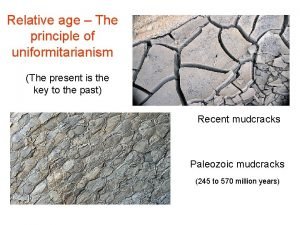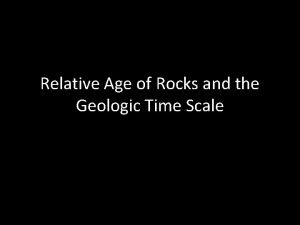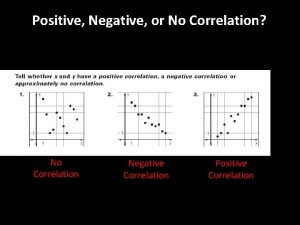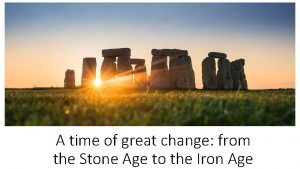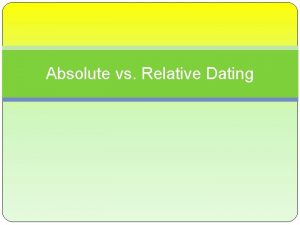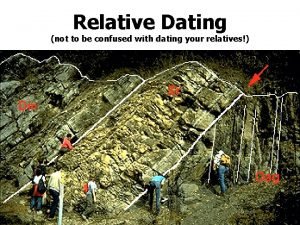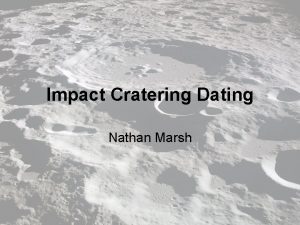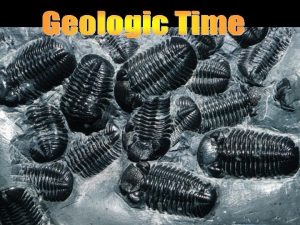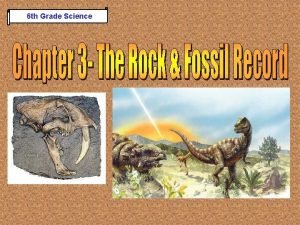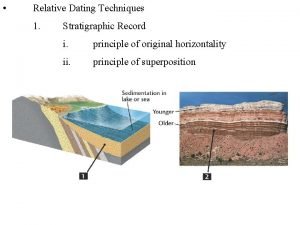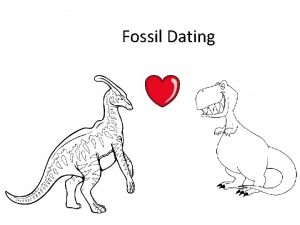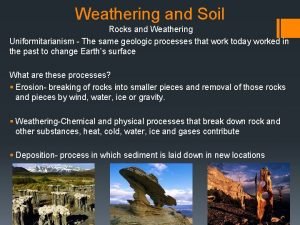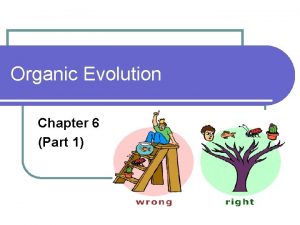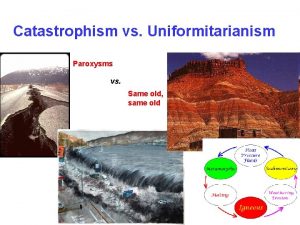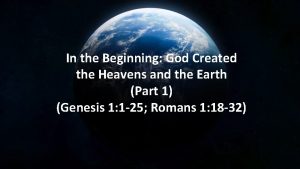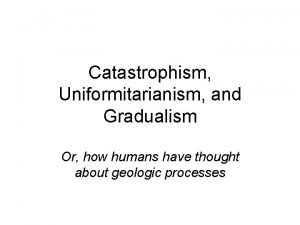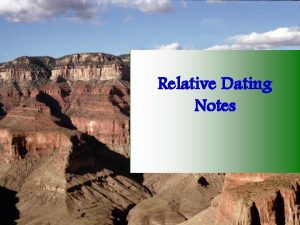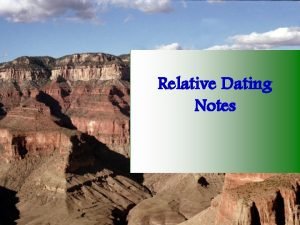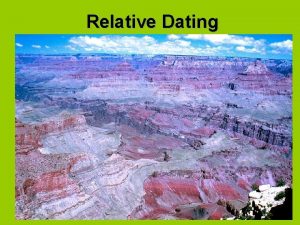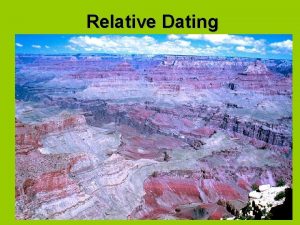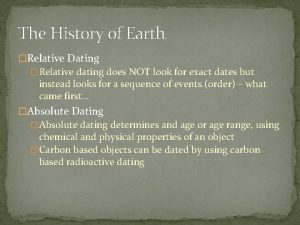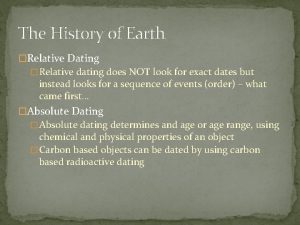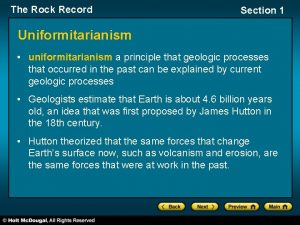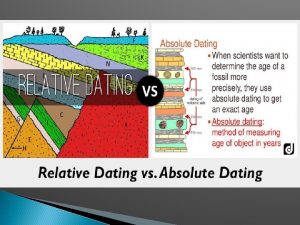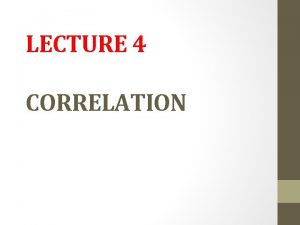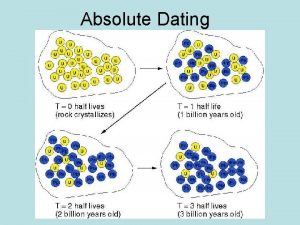Relative Age Dating Uniformitarianism Principles of correlation Original






























- Slides: 30

Relative Age Dating Uniformitarianism Principles of correlation Original horizontality Superposition Inclusion Cross-cutting relationships Biostratigraphy

James Hutton, Scottish Geologist Royal Society of Edinburgh meetings - 1785 Formations of rocks and soils on the Earth’s surface formed over long periods of time via processes observable on the modern Earth http: //de. wikipedia. org/wiki/James_Hutton This worldview became known as the Principle of Uniformitarianism, Uniformitarianism and specifically rejected supernatural causation to explain natural processes and formations. Coal gas first used for illumination; Louis XVI of France signs to a law that a handkerchief must be square; British government establishes a permanent land force in the Eastern Caribbean, based in Barbados; The North Carolina General Assembly incorporates Lincolnton, North Carolina (named for American General Benjamin Lincoln) as the new county seat for Lincoln County. (http: //en. wikipedia. org/wiki/1785)

Principle of Uniformitarianism Hutton’s work did not gain much acceptance for a long time – probably because the writing was dry. Later, Charles Lyell published a three volume set of books about interpreting geologic history. Unlike Hutton’s indigestible prose, Lyell’s books became required reading for the “natural philosophers” of the day. Charles Darwin brought the first volume with him to South America on the Beagle, and arranged to have the second and third volumes sent when they were published http: //en. wikipedia. org/wiki/Image: HMSBeagle. jpeg

Hutton, James, 1788. Theory of the Earth; or an Investigation of the Laws observable in the Composition, Dissolution, and Restoration of Land upon the Globe. Transactions of the Royal Society of Edinburgh, vol. I, Part II, pp. 209 -304, plates I and II. As it is not in the human record, but in natural history, that we are to look for the means of ascertaining what has already been, it is here proposed to examine the appearances of the earth, in order to be informed of operations which have been transacted in time past. It is thus that, from principles of natural philosophy, we may arrive at some knowledge of order and system in the economy of this globe, and may form a rational opinion with regard to the course of nature or to events which in time to happen. http: //www. uwmc. uwc. edu/geography/hutton. htm

Charles Lyell Principles of Geology is the science which investigates the successive changes that have taken place in the organic and inorganic kingdoms of nature; it enquires into the causes of these changes, and the influence which they have exerted in modifying the surface and external structure of our planet. By these researches in the state of the earth and its inhabitants at former periods, we acquire a more perfect knowledge of its present condition, and more comprehensive views concerning the laws now governing its animate and inanimate productions. http: //www. kcl. ac. uk/depsta/iss/archives//london/going 09 a. htm Lyell, Charles, 1830. Principles of Geology. [Fascimile 1990, University of Chicago Press. ]

Nicholas Steno (1638 -1686) Formulated logical principles for determining the relative ages of rocks http: //www. rjsmith. com/san_juan_river. html http: //www. ucmp. berkeley. edu/history/steno. html

Principle of Original Horizontality gravity Sedimentary rocks were deposited in primarily horizontal beds deposited last - youngest deposited first - oldest Principle of Superposition In an undisturbed sedimentary sequence, the oldest rocks are on the bottom of the stack

gravity Youngest Oldest Principle of Superposition In an undisturbed sedimentary sequence, the oldest rocks are on the bottom of the stack

Principle of Inclusion When clasts of one rock are found in another, the rock from which the clasts were derived is the older rock, since it must have already existed in order to be included in the new rock igneous intrusion Inclusions - pieces of older rock incorporated into younger rock

Principle of Inclusion When clasts of one rock are found in another, the rock from which the clasts were derived is the older rock, since it must have already existed in order to be included in the new rock Inclusions - pieces of older rock (clasts) incorporated into younger rock

(a scene from Jurassic Park) Principle of Cross-Cutting Relationships

Principle of Cross-Cutting Relationships Older features are cut or crossed by younger features.

Contact – surface separating two formations Hermit Shale Supai Group Redwall Lime stone Formation – bodies of rock with recognizable characteristic that are thick enough to map Muav Lim estone Bright A ngel Sha le Tapeats Sandsto ne

Reconstructing Geologic History The geologic history of an area can be divided into times during which: Rock is being formed or altered Rock is being eroded Periods of rock formation leave positive evidence of what geologic processes were in effect at the time of formation. Periods of rock erosion leave unconformities

Unconformities

Reconstructing Geologic History Unconformities represent missing time in the geological sequence, either due to no rock being formed or rock being removed. There are three kinds of unconformities: disconformity – unconformity between parallel strata. Represents a time of non-deposition or erosion without deformation of strata. angular unconformity – unconformity between nonparallel strata. Strata were deformed as well as eroded (not necessarily at the same time) nonconformity – unconformity representing erosion of a non-sedimentary rock

Reconstructing Geologic History disconformity unconformity between parallel strata. nonconformity unconformity between non-sedimentary and sedimentary rocks angular unconformity between nonparallel strata

William “Strata” Smith 1769 -1839 A trained surveyor with an avid interest in fossils, Smith suffered from rare condition for naturalist of his time - lowly birth. He worked in both the coal industry and supervised the digging of the Somerset Canal in England, but still spent time in debtors’ prison. Smith formulated the Principle of Faunal Succession, which he then used to draft the first modern geologic map, which serves as a model to the present day. http: //en. wikipedia. org/wiki/Image: William_Smith. JPG

London Clay Craig Upper Chalk Oak Tree Clay Upper Chalk http: //www. unh. edu/esci/wmsmith. html

William Smith’s geologic map of England, Wales , and Scotland. 6 x 9 ft http: //www. unh. edu/esci/wmsmith. html

Biostratigraphy X Time More Recent Fossil A O More Ancient Extinction - last appearance of species in fossil record Origination - evolution of species

Biostratigraphy A Time B Overlap zone C A B C

Biostratigraphy

http: //www-odp. tamu. edu/ Biostratigraphy for several wells off the coast of Suriname, South America. Correlation based on foraminifera, calcareous nannofossils and radiolarians.

Geologic Time Scale Devonian http: //3 dparks. wr. usgs. gov/coloradoplateau/images/timescale. jpg http: //pubs. usgs. gov/gip/geotime/

http: //thunderlizard. gn. apc. org/image_devonian. html http: //www. mgs. md. gov/esic/brochures/fossils/devofos. html Devonian Life http: //paleoprep. com/ http: //www. globaltrekkers. ca/wp-photo. php? id=152

Pleistocene Molluscan Assemblage

Foraminifera http: //services. chronos. org/foramatlas/pages/rcfo. htm http: //www. ucmp. berkeley. edu/people/klf/Micro. Gallery. htm

Geologic Time Scale The Geologic Time Scale subdivides the history of the Earth based on biostratigraphy and other dating techniques into: 4 Eons (Hadean, Archean, Proterozoic, Phanerozoic), each of which contains Eras (e. g. , Paleozoic, Mesozoic, Cenozoic) which are further subdivided into Periods (e. g. , Triassic, Jurassic and Cretaceous), Epochs and smaller time divisions http: //3 dparks. wr. usgs. gov/coloradoplateau/images/timescale. jpg

Geologic Time Scale Most people think of time in terms of blocks of seconds, minutes, years, etc. Geologists also use a concept called “rock time” which is time designations assigned to physical rock bodies. “Time”-Time “Rock”-Time Eonothem Erathem Period System Epoch Stage A sedimentary rock deposited during the Devonian Period would be a member of the Devonian System. http: //3 dparks. wr. usgs. gov/coloradoplateau/images/timescale. jpg
 Uniformitarianism relative dating
Uniformitarianism relative dating Relative age dating
Relative age dating Dating patterns since the 1960s are
Dating patterns since the 1960s are Positive correlation versus negative correlation
Positive correlation versus negative correlation Negative and positive correlation
Negative and positive correlation Iron age dates
Iron age dates Iron age bronze age stone age timeline
Iron age bronze age stone age timeline Absolute vs. relative dating
Absolute vs. relative dating Relative dating
Relative dating Relative dating
Relative dating Relative dating
Relative dating Relative age
Relative age Relative dating
Relative dating Relative dating
Relative dating Features of phacops and tropites as index fossils
Features of phacops and tropites as index fossils Relative dating examples
Relative dating examples Radiometric dating formula
Radiometric dating formula Absolute dating
Absolute dating How does temperature break down rocks
How does temperature break down rocks Hutton's principle of uniformitarianism
Hutton's principle of uniformitarianism Uniformitarianism examples
Uniformitarianism examples Whats uniformitarianism
Whats uniformitarianism Catastrophism vs uniformitarianism
Catastrophism vs uniformitarianism Uniformitarianism drawing
Uniformitarianism drawing Uniformitarianism
Uniformitarianism Uniformitarianism vs gradualism
Uniformitarianism vs gradualism Relative clauses and relative pronouns stage 15
Relative clauses and relative pronouns stage 15 Conditional relative frequency definition
Conditional relative frequency definition Relative pronouns
Relative pronouns Relative adverbs
Relative adverbs Relative age effect
Relative age effect
